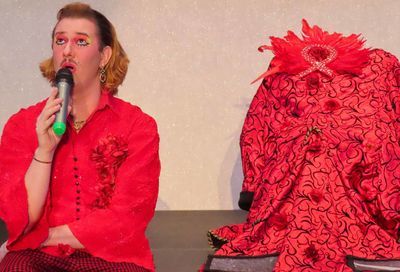Marriage or Mirage?
Commentary: Center Field
On Dec. 11, at a candid community discussion on the pursuit of D.C. marriage equality, a few participants noted that D.C. domestic partners already enjoy protections comparable to gay, married couples in Massachusetts and Connecticut. That raises a question: What are the potential gains and risks of proceeding with a marriage bill early in 2009, as D.C. Councilmember David Catania (I-At large) has indicated he plans to do?
There are several factors to consider. First, the U.S. Constitution gives Congress exclusive legislative power over the District of Columbia, and past Democratic congresses have infringed on D.C. Home Rule regarding gay issues. The fact that Democrats increased their majorities in both houses and won the White House does not mean they will respect D.C.’s local autonomy or support marriage equality. The many conservative ”Blue Dog” Democrats elected in 2006 and 2008 certainly will not. Even activists who favor moving forward on marriage equality expect Congress to bar the District from implementing it.
Second, D.C. Delegate to Congress Eleanor Holmes Norton (D) wants the marriage bill postponed until she can press her legislative agenda for the District, including a full, voting member of Congress as well as legislative and budgetary autonomy. Winning those first would put us in a stronger position to move ahead with marriage.
Third, the plan to block a ballot measure on the bill by making it an amendment to the D.C. Human Rights Act (whose protections are not subject to referendum or initiative) will be firmly challenged-including by Congress members-as an attempt to foil the popular will. While I agree that minority rights should not be subject to majority vote, politically this stratagem is too clever by half.
Fourth, nearly 60 percent of the D.C. population is African American, and polls show that a majority of black voters opposes marriage equality while a majority of white voters supports it. Those numbers can be improved, but it will require a concerted grassroots effort coupled with a well-funded media campaign.
Catania claims that those who say ”not now” are really saying ”not ever.” It is absurd to suggest that Norton, a staunch ally of the GLBT community, wants to put off marriage equality forever just because she asks for a few months’ delay. Treating those who don’t support one’s preferred timetable as opponents on the underlying issue is a poor way to cultivate allies, and fails to refute the reality-based activists who urge that we proceed in a smart and strategic way.
Jon Hoadley of Stonewall Democrats said at the town-hall meeting that we should make it clear that we will not accept the D.C. marriage bill being traded away for the sake of passing other legislation. That is easier said than done when we lack the votes on the Hill for marriage, but are better situated on hate crimes and employment discrimination. Denouncing congressional allies for such pragmatic trade-offs is likelier to grind the national GLBT legislative agenda to a halt than advance D.C. marriage equality.
Until marriage equality is achieved federally, marriages granted to same-sex couples by D.C. or the states will be unequal – and the difference between marriages and comprehensive domestic partnerships or civil unions will be largely symbolic. To be sure, marriage carries powerful symbolism, and nationwide demonstrations on Nov. 15 revealed new enthusiasm. Translating enthusiasm into victories, however, requires political savvy, outreach and organizing. With the holidays upon us and no campaign in place, the prospect of introducing a hot bill in a few weeks seems more a grandstanding gesture than part of a serious plan.
With Catania bent on moving ahead in January, we are faced with recruiting key allies in the African-American and faith communities within a few weeks. This work, which would provide political cover for wavering D.C. Council members, requires far more hands than the relative few who have reached across our city’s social divides over the years. As it stands, Catania is putting the cart before the horse.
I will be faulted for broaching these concerns publicly, but keeping silent out of solidarity will not make the problems disappear. Those whose enthusiasm outstrips their judgment should stop using talk of a generational split to dismiss the concerns of more experienced activists. Reality has a way of coming back to bite you. Let’s work methodically toward real, sustainable, marriage equality, not chase a mirage.
Richard J. Rosendall is a writer and activist whose work has appeared on Salon.com and the Independent Gay Forum, www.indegayforum.org. He can be reached at rrosendall@starpower.net.
Support Metro Weekly’s Journalism
These are challenging times for news organizations. And yet it’s crucial we stay active and provide vital resources and information to both our local readers and the world. So won’t you please take a moment and consider supporting Metro Weekly with a membership? For as little as $5 a month, you can help ensure Metro Weekly magazine and MetroWeekly.com remain free, viable resources as we provide the best, most diverse, culturally-resonant LGBTQ coverage in both the D.C. region and around the world. Memberships come with exclusive perks and discounts, your own personal digital delivery of each week’s magazine (and an archive), access to our Member's Lounge when it launches this fall, and exclusive members-only items like Metro Weekly Membership Mugs and Tote Bags! Check out all our membership levels here and please join us today!



















